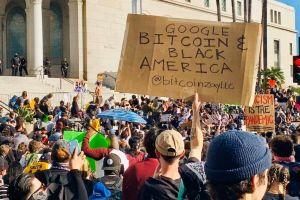Bitcoin and Black America: A Digital Uprising
In 2014, several surveys found that African Americans were less likely to know about and use Bitcoin (BTC). However, in 2020, a Coinbase study found that African Americans are now much more interested in and trustful of bitcoin and other decentralized digital currencies.

A turnaround
Speaking to The Atlantic in 2015, the founder of Storj, a decentralized blockchain-based cloud-storage service, Shawn Wilkinson explained the benefits that adopting bitcoin would have for black Americans.
“Bitcoin, or some kind of cryptocurrency, has the ability to decouple African Americans from the economic system in a positive manner. With Bitcoin, there are a lot more methods with microlending, where you can have communities using cryptocurrencies to help themselves without any intermediaries,” Wilkinson stated.
While the advantages offered by a decentralized and censorship-resistant digital currency like bitcoin, are myriad for a community that is historically underserved by the financial sector, experts believed that there were significant fears on the community’s part that would likely slow or impede adoption.
The first was the deep mistrust that black Americans have for traditional financial institutions. While BTC is as far removed from the banking sector as can be, experts believed that the apprehension towards it would likely colour any similar innovations introduced into the market, even those which would be digital and tech-based.
Nicholas Pearce, an assistant professor at Northwestern University’s Kellogg School of Management, told The Atlantic:
“The fact that many African Americans don’t use PayPal, or are even afraid to do retail banking, demonstrates this lack of trust in financial institutions, even when there is a face on the other side. Many times, you’ll hear them say, ‘I don’t trust banks, I’d rather put my money under a mattress and risk it being stolen than putting it in a bank for some unnamed institution to steal it.”
Secondly, Bitcoin’s association with shadowy figures in crime and dark web marketplaces did not do much to endear it to Black America. Lastly, the counter culture in which Bitcoin existed, in its early days, meant that the number of African Americans who came into contact with the digital currency was limited, thus hampering adoption.
In an interesting twist, a Coinbase report published in February 2020, showcased a complete turnaround in both the perception and interest in Bitcoin shown by Black America. The report found that 70% of the surveyed African Americans showed interest in bitcoin and crypto. These findings are significant, given that just six years prior, there was a negligible number of African Americans interacting with Bitcoin.
Why the change?
Curiously, one of the reasons pundits cited as a barrier to adoption for Black America became the reason why they are now drawn to the digital currency. As reported, Coinbase found that twice as many African Americans had been negatively affected by the traditional financial system in comparison to white Americans.
As a result, they were turning to decentralized digital currencies – especially BTC – in order to access a financial system that is not marred by any underlying bias, be it racial or gender-based.
Due to the fact that blockchain technology defines and controls how the cryptocurrency is issued and spent, Black America feels safer with Bitcoin as they are not at the mercy of any other group. Moreover, they have guaranteed financial sovereignty with the digital currency.
“Now the cool thing about crypto is it’s trustless technology. The system is neutral. Crypto moves us away from an environment where we need to assume trust in a group before we can do business. With crypto, there’s redundant systems that prevent someone from screwing you over. If you’re a minority or part of an underrepresented group, and you’re used to only trusting one type of ethnic group or social group, now you can expand your window,” the founder and CEO of Amentum, a cryptocurrency investment firm, Steven McKie, was quoted as saying by Coinbase.
The reduced access to traditional financial services likely explains why 70% of the surveyed African Americans are highly interested in cryptocurrencies. In contrast, only 42% of white Americans, who are generally well served by the financial sector, showcased an interest in crypto.
Coinbase’s findings suggest that Black America believes cryptocurrency will positively impact financial equality due to its decentralized and censorship-resistant qualities. In fact, the study found that 51% of Black America believed technology could be trusted to solve some of the world’s problems. This is in comparison to 39% of white Americans.
Bitcoin and Black America
The world watches as the US erupts in civil unrest over the death of George Floyd, reigniting centuries of racial tension. Americans of all hues have taken to the streets to demand an end to police brutality and racism under the Black Lives Matter movement.
Floyd’s death sparked an outpouring of solidarity from many corners of society with many corporations unequivocally condemning police brutality and racism. Within the cryptocurrency community, Square and Lolli have released statements condemning these societal ills.
Critics of the companies’ public statements have stated that politics should be kept out of Bitcoin and the cryptocurrency industry. However, human rights are not politics.
Human rights are unquestionably inherent to every human being and should be upheld by all. Additionally, it is important to note that Bitcoin is founded on the tenets of equality. It is within the spirit of Bitcoin to give access to all members of society, especially those who are unable to access services.
In his book ‘Bitcoin and Black America,’ Isaiah Jackson expounds on these issues, explaining how adopting bitcoin may be the catalyst to financial muscle for Black America, which is an important part of the road to true freedom.
As American society and Black America continue to seek justice and create lasting change, Jackson believes Bitcoin should play a major role.
He said: “I’m not saying Bitcoin can stop police violence but when the smoke clears we need an economic solution to make our community self-sufficient. Bitcoin has to be a part of that strategy because of censorship resistance, scarcity and remittance payments.”
What is clear is that Black America needs to have access to Bitcoin just as much as any racial and social group so that they too can benefit from the financial sovereignty that the decentralized digital currency provides.




